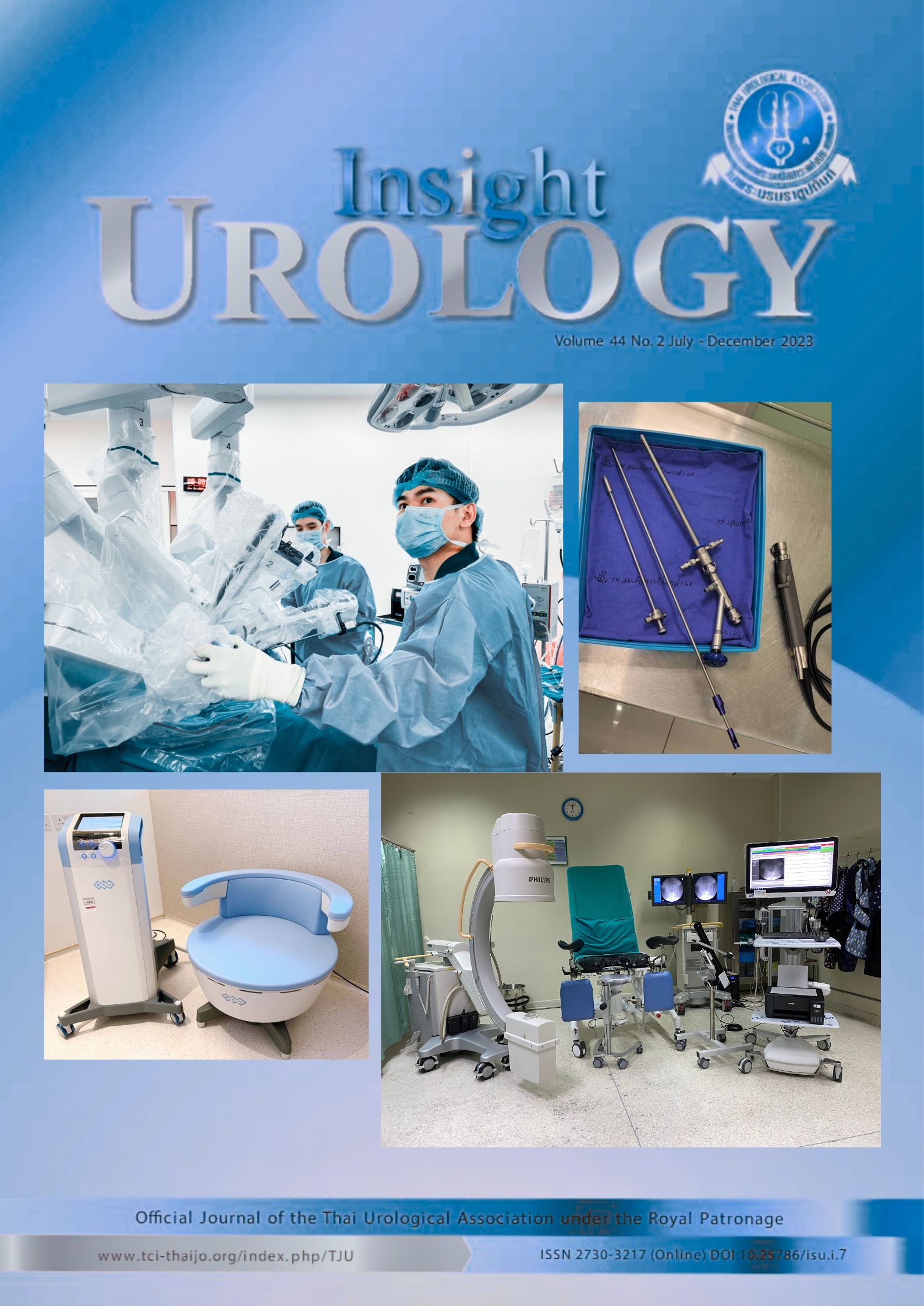Bibliometric analysis of the relationship between metabolic study and urolithiasis. A key tool in patient management
DOI:
https://doi.org/10.52786/isu.a.76Keywords:
Urolithiasis, prevention, metabolic evaluation, hypercalciuriaAbstract
Objective: Our objective was doing an analysis of available bibliography to understand tendencies in publications regarding the role of metabolic evaluation in the management of urolithiasis.
Materials and Methods: A retrospective bibliometric analysis of the available medical literature ranging from the year 2001 to 2022 was performed on the Web of Science platform. The graph analysis was done using Microsoft Excel and the bibliographic mapping analysis was done on the VOSviewer software.
Results: A total of 120 references were found in 63 journals, with a decrease in the rate of publications in the last 5 years. The country, journal, and institution with the largest number of manuscripts were the United States, Journal of Urology, and the University of Bonn, respectively. The author with the largest number of publications was Sarica Kemal. The mapping and analysis of the keyword evolution with respect to the timeline centered on the terms: “prevention”, “metabolic risk factors”, “obesity”, “primary hyperoxaluria”, and “medical management”.
Conclusion: Metabolic evaluation is a fundamental tool in the overall approach of these patients. Despite the decrease in the rate of research on the association between metabolic evaluation and urolithiasis in recent years, the importance of a complete assessment of these patients from the first symptomatic episode has been demonstrated, as it helps to determine the risk of recurrence of the disease, and to establish a treatment plan focused on prevention. This first bibliometric analysis on metabolic evaluation and urolithiasis depicts the importance of giving continuity to research on the risk factors of urolithiasis that may be modified and treated.
References
Habbig S, Beck BB, Hoppe B. Nephrocalcinosis and urolithiasis in children. Kidney Int 2011;80:1278-91.
Straub M, Strohmaier WL, Berg W, Beck B, Hoppe B, Laube N, et al. Diagnosis and metaphylaxis of stone disease: Consensus concept of the National Working Committee on Stone Disease for the Upcoming German Urolithiasis Guideline. World J Urol 2005;23:309-23.
Jalón Monzón A, Pellejero Pérez P, Álvarez Múgica M, Escaf Barmadah S. Interpretación del estudio metabólico en la litiasis renal y su tratamiento. Semergen 2021;47:38-46.
Skolarikos A, Straub M, Knoll T, Sarica K, Seitz C, Petřík A, et al. Metabolic Evaluation and Recurrence Prevention for Urinary Stone Patients: EAU Guidelines. Eur Urol 2015;67:750-63.
Erbagci A, Erbagci AB, Yilmaz M, Yagci F, Tarak- cioglu M, Yurtseven C, et al. Pediatric Urolithiasis. Scand J Urol Nephrol 2003;37:129-33.
Edvardsson VO, Indridason OS, Haraldsson G, Kjar- tansson O, Palsson R. Temporal trends in the incidence of kidney stone disease. Kidney Int 2013;83:146-52.
Hoppe B, Kemper MJ. Diagnostic examination of the child with urolithiasis or nephrocalcinosis. Pediatr Nephrol 2010;25:403-13.
Karabacak OR, Ipek B, Ozturk U, Demirel F, Saltas H, Altug U. Metabolic Evaluation in Stone Disease Metabolic Differences Between the Pediatric and Adult Patients With Stone Disease. Urology 2010; 76:238-41.
Castro Henríquez E. Estudio Metabólico en Nefrolitiasis: Una herramienta subutilizada y cómo implementarla en la práctica clínica. [Internet]. [cited 2023 January 30]: in press. Available from: https://www.aeurologia.com/EN/10.37554/es-20210422-3447-14
Martínez JML, Rio ASD, Galvez MPL. Medical treat- ment of renal stones. Arch Esp Urol 2021;74:63-70.
Traxer O, Corrales M, Sierra A. Metabolic evaluation: is there really a future? Curr Opin Urol 2022;32:373-8.
Sarica K. Obesity and stones. Curr Opin Urol 2019;29:27-32.
Bozkurt HB, Çetin T, Sarıca K. The Possible Beneficial Effect of Breastfeeding on the Clinical Course of Urolithiasis Detected During Infancy. Breastfeed Med 2020;15:84-9.
Downloads
Published
How to Cite
Issue
Section
License
Copyright (c) 2023 Insight Urology

This work is licensed under a Creative Commons Attribution-NonCommercial-NoDerivatives 4.0 International License.



